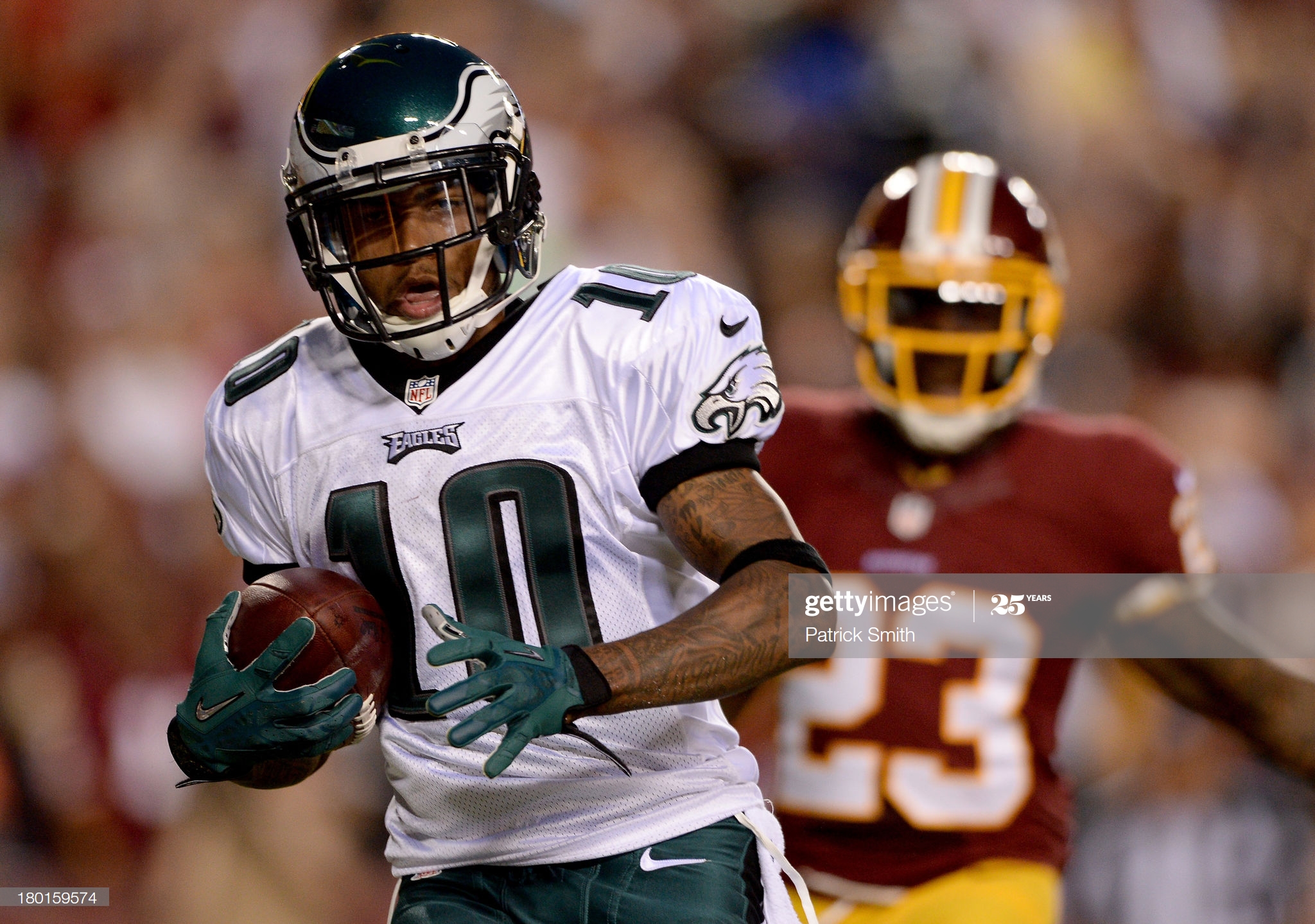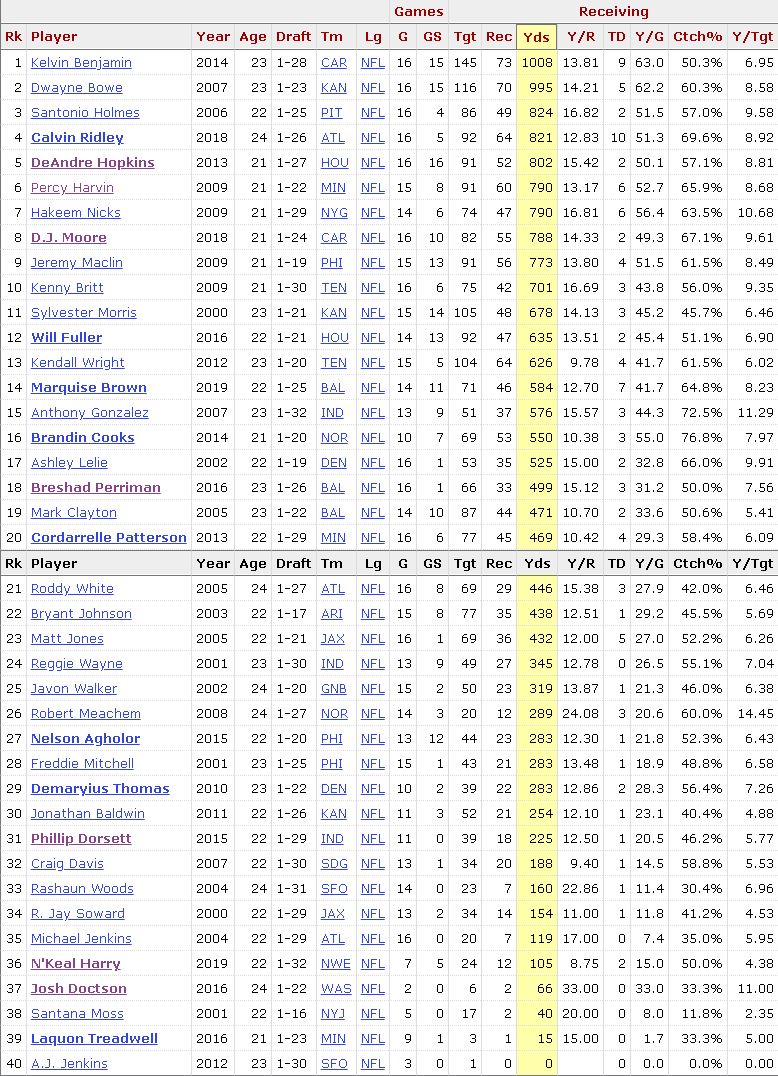
Carson Wentz is the most important player on the Philadelphia Eagles, and he’ll remain that for the duration of his career with the team. Such is the life of a quarterback, especially a great one, and even more so one on a $30 million-per-year contract.
The difference between an MVP season from Wentz and a mediocre one could easily be worth four or more wins to the team. For that sole reason, he’s exempt from this list.
Every other player on the active roster is eligible. Here’s the criteria I looked at to determine what constitutes a make-or-break player:
- Volatility – How much does the player’s performance fluctuate on a yearly basis? Case in point: Jason Kelce has been a First-Team AP All-Pro for three consecutive seasons. He’s started all 48 games during that stretch, and he’s been the anchor of the offensive line. Kelce’s performance has been outstanding for many years in a row, so you won’t see him on a list of make-or-break list because it’s pretty safe to assume he will be terrific in 2020.
- Positional Value – Davion Taylor was a third-round linebacker and will be given every opportunity to compete for snaps in the Eagles’ logjam of linebackers. But linebacker is a devalued position in Jim Schwartz’s defense. No matter whether Taylor starts or T.J. Edwards or Nate Gerry or Duke Riley or Jatavius Brown, it probably doesn’t really matter.
- Contract – This can’t help but be factored in. If Boston Scott doesn’t build on his 2019 season, it will be disappointing, but it will come at no financial penalty. If Darius Slay flops, that’s a lot to pay for a failed player.
Players will be listed in reverse order.
5. Jalen Reagor
With the majority of the Philadelphia fanbase clamoring for slot receiver Justin Jefferson, Howie Roseman opted for Jalen Reagor, a player most mock draft pundits thought would be available well into Round 2.
It’s not necessarily a bad pick on the surface, but much like Brandon Graham vs. Earl Thomas or L.J. Smith vs. Jason Witten, Reagor’s production will be compared obsessively to Jefferson. Reagor is more athletic than he’s given credit for. Despite ‘only’ running a 4.47 40, his game speed portrays a receiver who’s faster, and Reagor tested in the 99th percentile for burst, per Player Profiler.
The problem is the production of rookie wide receivers, particularly those drafted in the back half of the first round. Since 2000, there have been 40 first-round receivers drafted between picks 16 and 32 (excluding this past year).
The median production for those receivers was Cordarrelle Patterson in 2003, who posted a 45/469/4 statline. Kelvin Benjamin was the only player to top 1,000 receiving yards. Calvin Ridley was the only one to catch 10 touchdowns. None of them made the Pro Bowl. Even future superstars like Reggie Wayne (27/345/0) or Roddy White (29/446/3) were less then stellar.
The Eagles don’t typically rush their rookies into starting spots either. Andre Dillard sat for much of his rookie season. Miles Sanders was eased in as a committee back. Derek Barnett didn’t start a game until year two. If DeSean Jackson and Alshon Jeffery are both healthy and active, it’s fair to assume Reagor will cede snaps to both of them as well as Greg Ward. The Eagles also ran more 12 personnel down the stretch than any other NFL team in 2019.
If Reagor proves he can play immediately, he’ll work his way onto the field in packages and then in regular snaps. Jeremy Maclin was a bright spot as a rookie in 2009, hauling in 56 receptions for 773 yards and four touchdowns. If Reagor can come anywhere close to that production, the Eagles will have a dynamic offense. If Reagor struggles to make plays, it puts a lot of pressure on a pair of oft-injured aging players in Jackson and Jeffery.
4. Derek Barnett
When the Eagles drafted Derek Barnett, there was hope he would team with Brandon Graham to form an elite pass-rushing duo off the edge. Barnett was just 21 years old and had broken Reggie White’s career sack record at the University of Tennessee. As a rookie, he recorded five sacks in a backup role and recovered the game-winning fumble in the Super Bowl.
Barnett suffered a shoulder injury in his second year and missed 10 games. Last year as a full-time starter, he had 6.5 sacks and two forced fumbles in 14 starts. Those aren’t bad numbers but it’s not what the Eagles were hoping for when they drafted him. The Eagles picked up Barnett’s fifth-year option for 2021 probably more as a means of publicly supporting him, but still, there has been rampant offseason speculation that the team will sign Jadeveon Clowney or trade for Yannick Ngakoue.
The history of first-round defensive ends with 20 or fewer career starts through three seasons isn’t promising. Brandon Graham is on the list, and he turned into an excellent player. And Jerry Hughes broke out with a second team. But the rest of the players are disappointments like Shea McClellin and Shaq Lawson and Erasmus James and Shane Ray and Taco Charlton and Nick Perry. The Eagles won games in 2017 largely because of their formidable pass rush off the edge, and they desperately need Barnett to fulfill his draft stock this coming year.
There’s a reason Barnett isn’t higher though. Theoretically, the Eagles could always work a trade for Yannick Ngakoue (doutbful at this point). They could sign Jadeveon Clowney. They could sign Everson Griffen or maybe a veteran like Cameron Wake. If Barnett struggles, there are pass rushers available, probably even midseason.
3. DeSean Jackson
DeSean Jackson was a make-or-break player for the Eagles before he made headlines for anti-Semitic posts on Instagram. Jackson will not be released for his actions, but will need to undergo sensitivity training and pay a fine, which – purely from a football standpoint – is terrific news for Eagles fans that want to see Jackson in action for the 2020 season.
Jackson played just one game (plus a few snaps in another) last year, but made unbelievable music with Carson Wentz. He hauled in not one, but two 50-plus yard touchdown grabs, leading the Eagles to a 32-27 comeback win over the Washington Redskins. Jackson is entering his 13th season in the league but at age 33, he’s shown no signs of losing even a step of his explosive speed. He remains the premier deep ball tracker in the league.
Without Jackson, the Eagles had one of the slowest offenses in the league a year ago. Even with a top tier tight end duo of Zach Ertz and Dallas Goedert, the passing game consisted of methodical passes between the hashmarks that moved the chains. Safeties could play in because there was no deep threat over the top. It’s fair to assume Jackson won’t play all 16 games, especially since he hasn’t done that since 2013. But 12 games of Jackson at top speed would greatly improve the Eagles’ offense.
Can Jackson provide 800 yards and six touchdowns for the Eagles? Those aren’t even Pro Bowl numbers but the mere presence of a 4.3 speed deep threat would be more than Wentz had for the majority of last year. If Jackson can do what he did just two years ago for Tampa Bay and lead the NFL in yards per catch, Wentz could regain his 2017 form.
2. Andre Dillard
A year ago, Pro Football Focus rated the Eagles as having the best offensive line in the league. Jason Kelce, Brandon Brooks, and Lane Johnson are arguably the finest in the NFL at their respective position. Jason Peters did an underrated job at left tackle, and Isaac Seumalo was serviceable at left guard.
Since then, Brooks suffered a devastating Achilles tear and the Eagles just today announced that Peters will come back for his 12th season with the team. Right guard will no longer be a camp battle between Matt Pryor, Jack Driscoll, Nate Herbig, and Prince Tega Wanogho. It’s the future Hall of Famer at right guard, a totally new spot. It’s asking a lot for Peters to make the transition at age 38, but right guard just doesn’t have the same importance as left tackle. And every time Peters is counted out, he seems to come back and succeed.
Left tackle arguably remains the bigger problem. Bringing back Peters to start at left tackle would have been an admission of failure with the Dillard pick. Dillard struggled in limited action as a rookie in 2019, even getting benched at right tackle in the Seattle game. When Dillard played at least 30+ snaps last year, the Eagles were 2-3. When he didn’t play, the Eagles were 7-4.
A poor rookie campaign in no way means Dillard can’t develop into a competent or even star tackle. Eric Fisher was awful as a rookie in 2013. Trent Williams was one of the worst tackles in the NFL in 2010. Both have now developed into longtime franchise tackles.
Dillard reportedly put on enough muscle this offseason that he’s now a solid 335 pounds. He’s coached by the best offensive line coach in the league in Jeff Stoutland. If Dillard can take major strides forward this year, it will do wonders for his confidence while solidifying an Eagles offensive line that suffered a major blow with the Brooks injury.
1. Darius Slay
More than any other non-quarterback on this roster, Darius Slay is this year’s make-or-break player for the 2020 Eagles.
The organization’s recent history with acquiring big name cornerbacks is littered with pricey mistakes – Byron Maxwell, Nnamdi Asomugha, and Dominique Rodgers-Cromartie. The last Eagles cornerback to make a Pro Bowl was Asante Samuel in 2010. The last Eagles cornerback to even start 16 games in a season was Nolan Carroll in 2016.
They can’t draft cornerbacks either. Sidney Jones was a bust. Rasul Douglas is a fringe roster player at this point. We’ve seen Curtis Marsh and Eric Rowe and Trevard Lindley, and none of them have panned out.
Slay has the chance to be that high-profile corner who hits. The Eagles traded a 3 and a 5 for him and then rewarded him with a three-year, $50 million extension. That’s a lot of money for a corner who will be 30 by the end of his debut season with the club, and one who saw his coverage numbers drop last year.
Slay will be reunited with Jim Schwartz and he’ll be (hopefully) playing behind a great pass rush. If he can be the Big Play Slay that the team is paying him to be, he’ll make the draft whiffs of Sidney Jones and Rasul Douglas be much easier to bear. If Slay misses time due to injury, loses a step, and doesn’t provide turnovers like expected, this secondary is in big trouble.
Follow Cody Swartz on Twitter.
